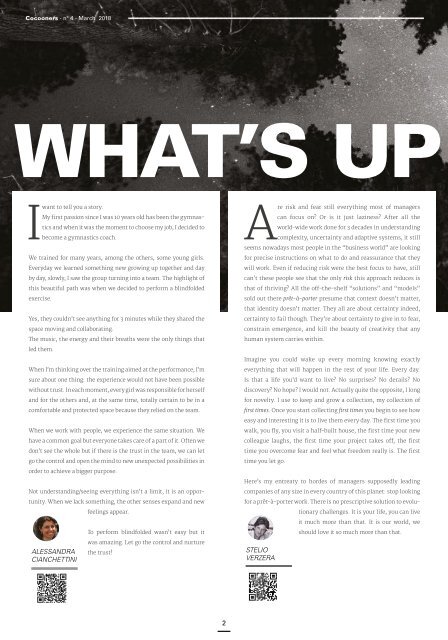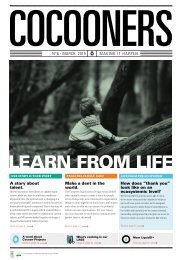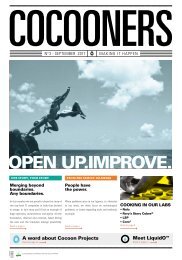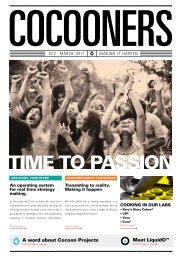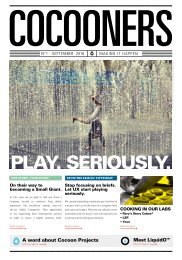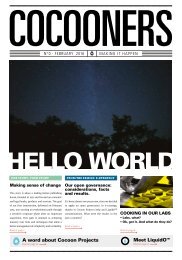COCOONERS - Making It Happen - No 4, March 2018
The digital version of our "Cocooners" half-yearly publication. Catch up about news, tools, thoughts, facts, people, work, future. Welcome to Cocooners. No 4, Mar 2018.
The digital version of our "Cocooners" half-yearly publication. Catch up about news, tools, thoughts, facts, people, work, future. Welcome to Cocooners. No 4, Mar 2018.
You also want an ePaper? Increase the reach of your titles
YUMPU automatically turns print PDFs into web optimized ePapers that Google loves.
Cocooners - n° 4 - <strong>March</strong> <strong>2018</strong><br />
Cocooners - n° 4 - <strong>March</strong> <strong>2018</strong><br />
WHAT’S UP<br />
I<br />
want to tell you a story.<br />
My first passion since I was 10 years old has been the gymnastics<br />
and when it was the moment to choose my job, I decided to<br />
become a gymnastics coach.<br />
We trained for many years, among the others, some young girls.<br />
Everyday we learned something new growing up together and day<br />
by day, slowly, I saw the group turning into a team. The highlight of<br />
this beautiful path was when we decided to perform a blindfolded<br />
exercise.<br />
Yes, they couldn’t see anything for 3 minutes while they shared the<br />
space moving and collaborating.<br />
The music, the energy and their breaths were the only things that<br />
led them.<br />
When I’m thinking over the training aimed at the performance, I’m<br />
sure about one thing: the experience would not have been possible<br />
without trust. In each moment, every girl was responsible for herself<br />
and for the others and, at the same time, totally certain to be in a<br />
comfortable and protected space because they relied on the team.<br />
When we work with people, we experience the same situation. We<br />
have a common goal but everyone takes care of a part of it. Often we<br />
don’t see the whole but if there is the trust in the team, we can let<br />
go the control and open the mind to new unexpected possibilities in<br />
order to achieve a bigger purpose.<br />
<strong>No</strong>t understanding/seeing everything isn’t a limit, it is an opportunity.<br />
When we lack something, the other senses expand and new<br />
ALESSANDRA<br />
CIANCHETTINI<br />
feelings appear.<br />
To perform blindfolded wasn’t easy but it<br />
was amazing. Let go the control and nurture<br />
the trust!<br />
Are risk and fear still everything most of managers<br />
can focus on? Or is it just laziness? After all the<br />
world-wide work done for 3 decades in understanding<br />
complexity, uncertainty and adaptive systems, it still<br />
seems nowadays most people in the “business world” are looking<br />
for precise instructions on what to do and reassurance that they<br />
will work. Even if reducing risk were the best focus to have, still<br />
can’t these people see that the only risk this approach reduces is<br />
that of thriving? All the off-the-shelf “solutions” and “models”<br />
sold out there prêt-à-porter presume that context doesn’t matter,<br />
that identity doesn’t matter. They all are about certainty indeed,<br />
certainty to fail though. They’re about certainty to give in to fear,<br />
constrain emergence, and kill the beauty of creativity that any<br />
human system carries within.<br />
Imagine you could wake up every morning knowing exactly<br />
everything that will happen in the rest of your life. Every day.<br />
Is that a life you’d want to live? <strong>No</strong> surprises? <strong>No</strong> derails? <strong>No</strong><br />
discovery? <strong>No</strong> hope? I would not. Actually quite the opposite, I long<br />
for novelty. I use to keep and grow a collection, my collection of<br />
first times. Once you start collecting first times you begin to see how<br />
easy and interesting it is to live them every day. The first time you<br />
walk, you fly, you visit a half-built house, the first time your new<br />
colleague laughs, the first time your project takes off, the first<br />
time you overcome fear and feel what freedom really is. The first<br />
time you let go.<br />
Here’s my entreaty to hordes of managers supposedly leading<br />
companies of any size in every country of this planet: stop looking<br />
STELIO<br />
VERZERA<br />
for a prêt-à-porter work. There is no prescriptive solution to evolutionary<br />
challenges. <strong>It</strong> is your life, you can live<br />
it much more than that. <strong>It</strong> is our world, we<br />
should love it so much more than that.<br />
There is an important shift in the way people work and<br />
live together. A shift that is only a matter of awareness,<br />
because in its very nature it is well known by the human<br />
kind (even if not by every human).<br />
I’m talking about the shift from ego-istic behaviours to eco-istic<br />
behaviours.<br />
And it is not related to a quality of the person (there is not such<br />
a thing like “being an egoist”), but to complex interdependencies<br />
with the context that allow or not the rising of certain behaviours.<br />
Everybody, and you can recognize it in yourself, sometimes acts<br />
selfishly and sometimes acts altruistically. <strong>It</strong> is perfectly fine and it<br />
is a good thing having both behaviours. But there is a third possibility,<br />
represented by what I called “ecoism”. Ecoism means deliberately<br />
acting for the advantage of the ecosystem(s) in which we<br />
live, not just for a personal benefit or an altruistic aim but because<br />
of a deep understanding of being at the same time an individual<br />
and the system itself. Even if it sounds like a very complex definition,<br />
everyone knows what it means to act ecoistically: think about<br />
a mother with her family. <strong>It</strong> is not egoism, it is not altruism, it is a<br />
deep feeling of uniqueness of her with her family.<br />
I’m talking about it in many places and I’m going to write more<br />
extensively about this topic, but the point is: it is time to become<br />
aware of the power of our ecosystems, and we need to uncover our<br />
natural ability to work and to live in this complexity.<br />
EMANUELE<br />
RAPISARDA<br />
CUSTOMER PROJECTS<br />
13 ITERATIONS<br />
17 FACILITATORS<br />
5 COUNTRIES<br />
TALKING ABOUT US<br />
FACCIAMO<br />
L’EVOLUZIONE<br />
Ecoism is a first important step in this<br />
journey. The possible results are unknown<br />
but it’s definitely worth it.<br />
<strong>It</strong> is normal for children to ask questions. Asking is one of the<br />
most natural ways to explore what we do not know and thus<br />
build an understanding of what surrounds us.<br />
As we grow up, however, we tend to lose the habit of asking to discover<br />
and understand who or what we have in front of us.<br />
Avoiding generalisations, and bearing in mind that asking is allowed<br />
or even encouraged in some contexts, it is nevertheless often seen as<br />
a disrupting element. In school it is not always allowed to interrupt<br />
in order to ask questions, and those who ask too much are often seen<br />
as the “difficult ones” who do not get it the first time. Even at work,<br />
asking too many questions can be interpreted as a sign of incompetence.<br />
As adults, in short, we run the risk of becoming used to asking<br />
just for the sake of conversation, losing the excitement of discovering<br />
through our questions.<br />
SOME OF OUR HIGHLIGHTS FOR THE 2ND HALF OF 2017<br />
COCOON LABS<br />
5 ACTIVE LABS<br />
18 PEOPLE INVOLVED<br />
5 WORKSHOPS<br />
THRIVING FIVE: MULTIGENERATIONAL<br />
WORKING BY DESIGN [3RD HANGOUT]<br />
And yet, people like me, whose job it is to design services, know very<br />
well that asking questions is crucial in order be able to design something<br />
that really meets the needs of its users.<br />
In a broader perspective, complexity is increasingly becoming an<br />
integrated part of our professional world and society, and even in life<br />
in general it is important to have a beginner’s mindset, which is the<br />
key to discovering, learning and adapting to change.<br />
To do so, however, we need to be able to question our own certainties,<br />
make room for new information and be able to empathise with<br />
GUIDO<br />
MARTINI<br />
others.<br />
Therefore, let us remember not to be afraid to<br />
ask and to try and keep that curiosity alive, like<br />
when we were kids.<br />
CP OPEN GOVERNANCE<br />
12 NEW CONTRIBUTORS<br />
14 PEOPLE SHIFTS<br />
TRANSITION TO WELO COMPLETED<br />
EODF ITALY FIRST COUNTRY MEETING,<br />
25 OCTOBER 2017<br />
2 3


